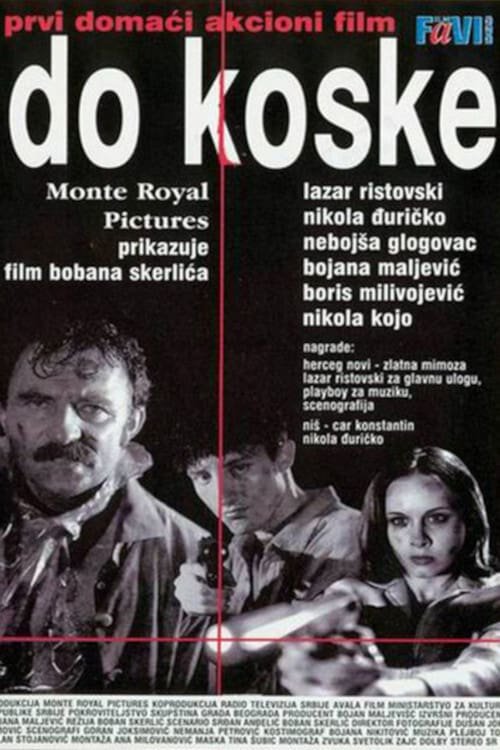
Before the collapse of Communism, East European masses have been led to believe that the capitalism would allow anyone to become rich. But the dream became reality only for tiny minority. The overwhelming majority suddenly became impoverished and baffled by the way their more fortunate neighbours had their wealth gained with apparent lack of trying. Consequences of this sudden change are explored in Rage a.k.a. Do koske, Serbian 1998 drama directed by Slobodan Skerlić.
The story begins in 1996 Belgrade. There are only two classes of people who enjoy good life - those close to Milošević's regime and gangsters. Kovač (played by Lazar Ristovski) is one of Serbia's more successful gangsters. Through the years he earned enough money to afford luxurious mansions, expensive cars and sexy mistresses. Because of this many young and impoverished Serbs see him as their role model. Kovač returns this affection by acting as a father figure towards young men employed in his outfit. His trust is going to be abused by two teenagers who abduct him. This happened on impulse and two youths don't have a clue why they did it and what to do with their prisoner. Gradually they begin to see opportunity to instantly gain the wealth that Kovač used to gather through years. They put Kovač to terrible torture in order to extract business secrets from him. As night goes on, it becomes clear that their enterprise would result in nothing but senseless bloodshed.
Many critics saw great similarity between Rage and Tarantino's Reservoir Dogs. This film was, however, more inspired by the dark realities of 1990s Serbia - country ravaged by wars, UN sanctions, corrupt regime, ruined economy and almost complete disappearance of morals from society. Rage makes the point very similar to Dragojević's The Wounds - the collapse of Communism deprived the youngest generations of any moral anchor. All that was left is a dog-eat-dog world where poor are getting poorer and rich are getting richer. The latter almost always do it through illegal and often violent means. Young men, instead of going to school and working hard, are offered much more attractive alternative of drug dealing, extortion and contract killings.
Skerlić and his co-writer Srđa Aleksić underline this by confronting the youths with the character of Kovač. He is portrayed as tough gangster, but also a man stuck to the past when some sort of values, rules and order used to exist. In a society where gangsters are celebrated as folk heroes, he desperately wants to become a respectable businessman and part of establishment. Rage shows that this isn't such hopeless ambition - in Milošević's Serbia gangsters were part of the establishment. Many of them began their criminal careers by conducting dirty work for Tito's secret police and in exchange had their "ordinary" enterprises tolerated by regime. This tradition was continued in Milošević's days where people like Kovač began to have business empires or started their own political parties. But, instead of making mobsters more "civilised", this merger of crime and establishment only made Serbia more violent, leading to most prominent businessmen and even prime ministers being assassinated gangland-style. This system, regardless how corrupt and twisted, nevertheless proves superior to those who, like two clueless protagonists, don't play by any rules at all. Rage shows that in its surrealist, ironic and bloody finale.
This finale, however, proves to be the film's weakest point. Skerlić's direction is the best in the scenes that expose the characters and feature intense drama. Spectacular gunfight in the abandoned warehouse is, on the other hand, cliche taken from cheap American action films. Without it, Rage could have been a very good film in the same rank with Dragojević's The Wounds. The acting is superb with veteran Lazar Ristovski delivering incredibly powerful performance in very demanding role. Ristovski is convincing whether he plays seemingly benign father figure or diabolically defiant torture victim. His talent is such that the role survives even some of the more theatrical lines of dialogue. Ristovski's younger colleagues also deliver a good job, especially Bojana Maljević in the role of Kovac's girlfriend Maja.
Although flawed and despite having potentially disturbing scenes, Rage deserves recommendation. It shows that insightful social and political commentary could be found even in genre films.
RATING: 6/10 (++)
(Note: The text in its original form was posted in Usenet newsgroup rec.arts.films.reviews on July 14th 2004)
Blog in Croatian https://draxblog.com
Blog in English https://draxreview.wordpress.com/
Cent profile https://beta.cent.co/@drax
Minds profile https://www.minds.com/drax_rp_nc
Uptrennd profile https://www.uptrennd.com/user/MTYzNA
Rising Star game: https://www.risingstargame.com?referrer=drax
BTC donations: 1EWxiMiP6iiG9rger3NuUSd6HByaxQWafG
ETH donations: 0xB305F144323b99e6f8b1d66f5D7DE78B498C32A7
